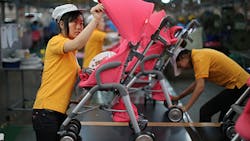China Manufacturing Output Hits a Tepid Three-Month High: HSBC
BEIJING - China's manufacturing growth picked up to a three-month high in October, a closely watched private survey confirmed Monday, but did little to counter a picture of slowing growth in the world's second-largest economy.
British bank HSBC's final purchasing managers index (PMI) came in at 50.4 last month, above the 50-point level that separates expansion and contraction and the strongest since July's 51.7.
The index tracks activity in factories and workshops and is considered a key indicator of the health of China's economy, a major driver of global growth.
On Saturday China's official PMI from the National Bureau of Statistics came in at 50.8 last month, lower than the 51.1 recorded in September and the weakest in five months.
HSBC's figure was the same as its preliminary result announced last month and higher than the 50.2 recorded in September, "but nonetheless continued to signal only a fractional improvement in the health of the sector," the bank said in a release.
Shanghai's benchmark stock index ended at up 0.41% a 21-month high of 2,430.03 as the latest data sparked hopes of policy easing.
Qu Hongbin, HSBC economist in Hong Kong, added that while the figure indicated continuing stabilization of the sector, the overall situation remained fragile.
"The economy still shows clear signs of insufficient effective demand," Qu said in the release.
"We still see uncertainties, given the property downturn as well as the slow pace of global recovery, and expect further monetary and fiscal easing measures in the months ahead."
The HSBC survey, compiled by information services provider Markit, showed output and new business components expanded at their weakest paces in five months while growth in new export orders also slowed, the bank said.
'Further Slowdown'
China's economy expanded 7.3% in the third quarter, the government said in October, lower than the 7.5% of the previous three months and the slowest since 2009 at the height of the global financial crisis.
"Although the PMIs diverged in October, the breakdown of both is consistent with cooling domestic demand and a further slowdown in growth going into Q4," Julian Evans-Pritchard, China economist at Capital Economics, wrote in a reaction to the data.
He added that growth should decelerate further to 7.2% in the final three months of the year.
Authorities set a 2014 growth target of about 7.5%, the same as 2013, though officials including Premier Li Keqiang say they will be satisfied even if actual expansion is slightly slower, so long as employment remains resilient.
China has since April used a series of limited measures to underpin growth, including targeted cuts in reserve requirements -- the amount of funds banks must put aside -- and a 500 billion yuan ($81 billion) injection into the country's five biggest banks for re-lending.
A slowdown in China's huge property sector is also weighing on overall growth, with analysts worrying that falling housing prices could put downward pressure on economic expansion.
New home prices in China declined for a sixth straight month in October, according to a private survey, though the pace of the fall slowed markedly.
The average price of a new home in 100 major cities was 10,629 yuan per square meter in October, down 0.4% from September, the China Index Academy said Friday, smaller than the 0.92% fall recorded in September.
The People's Bank of China, the central bank, announced steps at the end of September seen as bolstering demand for housing, including allowing borrowers who had paid off previous mortgages to be treated as first-time buyers and thus enjoy preferential policies.
"We believe the property market is reacting favorably in the second half of October to the government easing measures," Mizuho Securities economists Shen Jianguang and Michael Luk said Monday in a research note.
- Kelly Olsen, AFP
Copyright Agence France-Presse, 2014
About the Author
Agence France-Presse
Copyright Agence France-Presse, 2002-2025. AFP text, photos, graphics and logos shall not be reproduced, published, broadcast, rewritten for broadcast or publication or redistributed directly or indirectly in any medium. AFP shall not be held liable for any delays, inaccuracies, errors or omissions in any AFP content, or for any actions taken in consequence.
